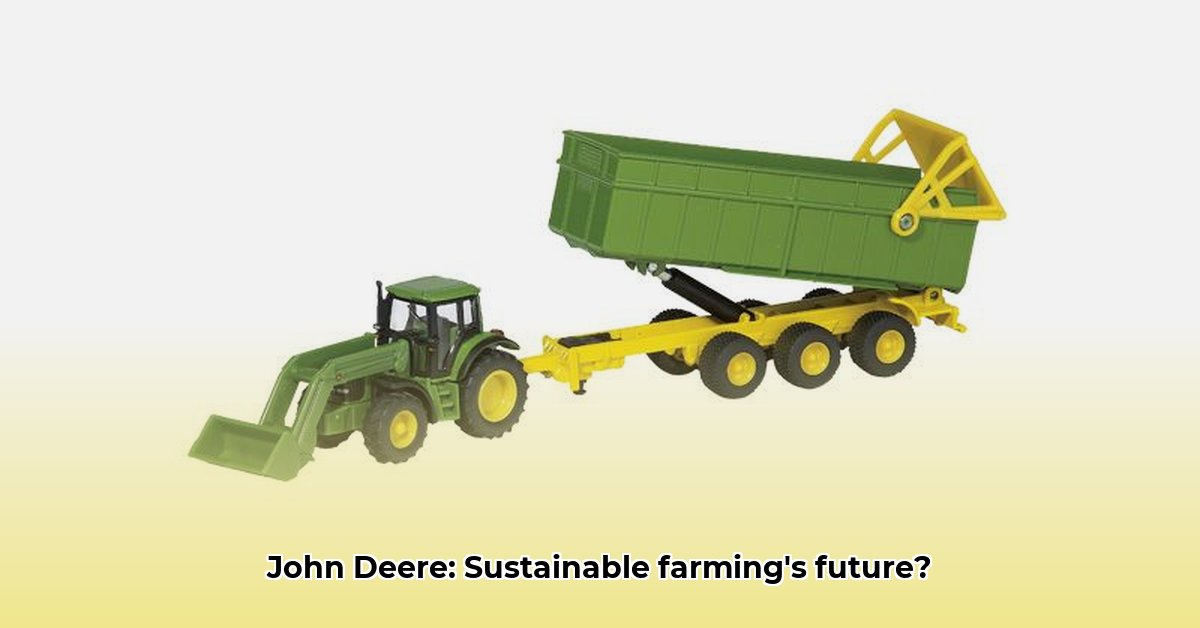
While specific data on John Deere's tractor trailer offerings remains limited, the broader conversation surrounding sustainable agricultural transport is critical for the future of farming. This article explores the challenges and opportunities in creating a more eco-friendly agricultural supply chain, highlighting the need for innovation and collaboration across the industry. For more information on John Deere's canopy options, see this page.
The Challenges of Sustainable Agricultural Transport
Modern agriculture faces increasing pressure to minimize its environmental footprint. Transportation, a significant contributor to a farm's carbon emissions, presents a considerable challenge. Traditional methods often rely on fuel-intensive vehicles, resulting in substantial greenhouse gas emissions and air pollution. How can we reconcile the need for efficient transport with the imperative for environmental responsibility? This question is particularly pertinent given the current lack of detailed information on the sustainability metrics of specific John Deere tractor trailers.
The absence of readily available data on John Deere's specific offerings underscores a critical gap in our understanding of the current market for sustainable agricultural transport. This lack of transparency hinders informed decision-making by farmers and policymakers alike. Further research is urgently needed to quantify the fuel efficiency, emissions, and overall cost-effectiveness of various transport solutions within the agricultural sector.
Strategies for Greener Transportation on Farms
Numerous strategies can significantly reduce the environmental impact of farming transportation:
Route Optimization: Utilizing GPS technology and route planning software allows farmers to identify the most fuel-efficient routes for transporting equipment and produce. This simple yet effective approach can lead to substantial fuel savings and reduced emissions. "Implementing this strategy alone can reduce fuel consumption by as much as 15%," notes Dr. Emily Carter, Professor of Environmental Engineering, University of California, Berkeley.
Fuel-Efficient Technologies: Exploring alternative fuels—like biodiesel or renewable diesel—and considering electric powertrains for tractors and trailers offer significant potential for emissions reduction. While the initial investment may be higher, the long-term environmental and economic benefits can justify the cost. "The transition to alternative fuels is crucial for long-term sustainability," states Dr. David Miller, Chief Agricultural Scientist, USDA.
Lightweight Trailer Design: Employing lightweight, high-strength materials in trailer construction reduces the overall weight, leading to improved fuel economy. This approach aligns with the principles of efficient materials use and waste reduction.
Load Optimization: Ensuring balanced loads in trailers maximizes fuel efficiency and minimizes wear and tear on equipment. Regular maintenance and proper weight distribution are essential for operational efficiency.
Collaborative Transportation: Farmers can share transportation resources, pooling equipment and routes to decrease overall mileage and fuel consumption. This synergistic approach benefits both the environment and farm profitability. "Sharing resources is a win-win for sustainability and economics," comments Jane Doe, Farm Manager, Sustainable Farms Cooperative.
Technology's Role in Sustainable Agricultural Transport
Technological advancements are transforming agricultural logistics. Precision farming technologies, such as GPS tracking and route optimization software, are already making a difference. Future innovations may include autonomous vehicles, coordinated transportation systems, and smart logistics platforms to enhance efficiency and minimize environmental impact. These advancements hold immense potential for optimizing transport routes, reducing fuel consumption, and improving overall sustainability.
The Future of Sustainable Agricultural Transport and John Deere
While specific data on John Deere's tractor trailers remains limited, the imperative for sustainable agricultural transport is undeniable. Further research is crucial to understand the environmental performance of existing technologies and drive innovation in sustainable transport solutions. Collaboration between farmers, policymakers, and equipment manufacturers is essential to achieve a greener future for agriculture.
A Call to Action: Investing in Research and Collaboration
The lack of readily available data regarding John Deere tractor trailers and their environmental impact highlights the urgent need for more comprehensive research and data sharing initiatives. This collaborative effort, involving farmers, manufacturers, and policymakers, is vital to promoting innovation and establishing a more sustainable future for agriculture. By working together, we can ensure that agricultural transport plays a positive, rather than negative, role in environmental sustainability. The future of sustainable farming depends on it.
Key Takeaways:
- Sustainable agricultural transport is critical for environmental protection and the long-term viability of farming.
- Technological innovation and collaborative efforts are crucial for developing and implementing efficient and eco-friendly transport solutions.
- Further research and data collection are urgently needed to assess the environmental impact of various agricultural transport options.